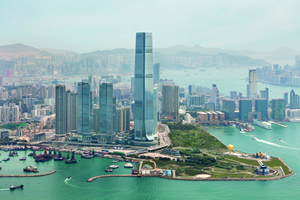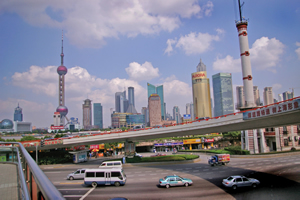Doing Business in ChinaThe People’s Republic of China’s 12th Five-Year Plan (2011-2015), recently approved by the National People’s Congress, envisages an urbanisation rate of 51.5% and coastal regions turning from ‘the world’s factory’ to hubs of R&D, high-end manufacturing and the service sector. It also welcomes foreign investment in modern agriculture, high-tech and environment protection industries. News and Features Editor Neil Steedman debunks two myths and offers eight first steps and two case studies for Irish companies thinking of doing business in China, and Beijing-based Irish lawyer Raymond Moroney offers advice on entering the market. The first myth is that China is a market of 1.341 billion people – it isn’t. True, China does have 19% of the world’s population, but 70% of these are rural dwellers with minimal income levels (average ?350 a year, ?1.00 a day). At the other end of the (widening) wealth gap, however, over one million citizens earned more than ?100,000 last year, while in the middle there are over 300 million who are in the market for western goods and services – so still a lot of consumers!  The second myth is that China is ‘a market’ – it isn’t. The country occupies 900 million hectares (3.5m sq miles) and comprises four regions – southern, northern, central and western – that vary significantly in population, accessibility, wealth, tastes, regulations, etc (see photo captions). About half of all urban retail sales occur in the 15 largest cities with populations over five million, while another 65 cities have over two million – so a lot of large markets! Ten years ago, China was still seen as the country for low-cost, low-tech manufacturing, but this has changed – and continues to do so. First, the costs are not so low (Vietnam is now attracting low-cost manufacturing) and China is rapidly becoming high-tech. Second, China is now a prime export market for many products and services. Enterprise Ireland clients with companies based in China have tripled from 40 just five years ago to more than 120 (with 5,000+ employees) – but there are now also 200+ Irish companies exporting to China. Get Ready for ChinaCathy Holahan, Enterprise Ireland’s China Senior Market Advisor, High Growth Markets Group, says: “Get ready for China, because this is their century. Doing business in China is all about building relationships and perseverance is important. For exporters it can take 12-18 months to get into a market – they need not reinvent the wheel but should talk with people who are there already. “Overall the biggest opportunities by far are in medical devices and pharmaceuticals, followed for indigenous Irish companies by food and drink, then education. Other sectors include software and ICT, financial services, construction, electronics, life sciences, green technologies and environmental consultancy. “The biggest challenges are the considerable resources (time, money and effort) required – initial research can take ?5,000 per week, three or four times a year, while a Representative Office can cost up to ?30,000 per month, depending on location. Others include the distances – particularly for product distribution, cultural differences, language and regional dialects, intellectual property rights, the fluctuating Renminbi, and pollution.” Eight First StepsDo Your Homework!First, do your homework in Ireland. There is much to learn, many people to meet, and serious research to be done before you even think of booking a flight to China. Consult Enterprise IrelandSecond, consult Enterprise Ireland, The Plaza, East Point Business Park, Dublin 3, (www.enterprise-ireland.com). Enterprise Ireland helps Irish companies increase business volumes in China by providing, through effective teamwork, country and industry specific expertise from market advisers employed to help companies that are preparing, implementing or accelerating their presence in China. Enterprise Ireland has offices in Beijing, Shanghai, Guangzhou and Hong Kong and its 2008 exporters’ handbook, ‘Winning Business in China’ (currently being updated) is a valuable reference. Contact Chinese EmbassyThird, contact the Embassy of the People’s Republic of China, 77 Ailesbury Road, Dublin 4, (ie.china-embassy.org). The Economic and Commercial Counsellor’s Office provides good support for exporters, including commercial guidelines and visa applications, as well as information on China’s policies, strategies, and laws and regulations. It assists Irish and Chinese companies and enterprises in bilateral trade and investment, and with trade delegations, fairs and exhibitions, business seminars, developing contacts, etc Join Ireland China AssociationFourth, join the Ireland China Association (www.irelandchina.org), which brings together Irish and Chinese business people to network and explore business opportunities through business breakfasts, lunches, seminars, evening briefings, and its monthly electronic newsletter, Chinawatch. There are four categories of membership: Patron, for companies with 250+ employees (?1,500 one year / ?2,500 two years); Corporate/Overseas, for companies with 10-250 employees or overseas companies with no base in Ireland (?400 / ?650); Individual, for individuals or companies in Ireland with fewer than 10 employees (?75 a year); and Student, for registered students only (?25 a year). Consult Confuctius InstituteFifth, consult the Confucius Institute in UCD Dublin (www.ucdcii.ie) or UCC Cork (www.ucc.ie/en/AsianSchool/Confucius). Both provide courses in Chinese language and culture, develop educational and commercial links between Ireland and China, and collaborate with Renmin University (UCD) and Shanghai University (UCC). UCD has published ‘Doing Business in China, the Irish Experience’ and, based on in-depth interviews with Irish people with many years’ business experience in China, is preparing a new book, ‘Road to Success: the Similarities and Differences between Irish and Chinese Business Culture’. UCC has a live series of distance learning modules, ‘Doing Business in China’, co-written by Chinese experts and endorsed by IBEC (uccchina.intuition.com). Appoint Chinese SpeakerSixth, appoint a Chinese speaker (and reader/writer) to work for you – perhaps a Chinese student or Irish graduate. Your company is in for the long haul and they will prove invaluable. Third-party China consultancies can also help to source information, manufacturers / distributors / suppliers, financial, legal and cultural advice, interpreters, etc.  Establish Corporate PresenceSeventh, establish your corporate presence in China. A Representative Office is often used for the initial research phase, followed by a Joint Venture or Wholly Foreign-Owned Enterprise. Eoin Whelan, Director of International Tax at BDO, advises: “In the past four years more Irish companies have chosen a WFOE, which is a lot more secure than a Joint Venture. China is a semi-closed economy controlled by the Chinese Government. You also need to know in advance how profits can be repatriated – there is a Withholding Tax on dividends of 10%, but reduced to 5% by the Ireland-China Double Tax Treaty.” Get The Chop!Eighth, get the chop. While signatures are used to validate documents or bind a contractual relationship in the West, the chop is the primary tool in China. Several chops are available to each entity: the Company Chop, Legal Representative Chop, Finance Chop, Contract Chop, and Customs Chop. A legally registered company is required by law to have at least one Company Chop, which is the most important of the organisation. This chop can legally bind the company and is required on documents such as contracts, internal and external memorandums, documents filed with the government, or bank account applications. Two Case StudiesThe following two companies have successfully established manufacturing operations in China, but many of the lessons learnt are equally relevant to companies exporting to China. Aqueduct InvestmentsThis April, bag-in-box filtered water cooler company Aqueduct Investments International Ltd launched on the Irish market a new commercial cooler, designed in Ireland but manufactured by partner Hisense in China. Director Kieran McKenna presented the following advice at a recent business breakfast hosted by the Ireland China Association:
Zed CandyIn 2008, after two years of research and preparation, Blanchardstown-based confectionary company Zed Candy opened a 14,000 sq m factory in Dongguan, Guangdong province, employing 200 people. The company now distributes to 43 countries and in recent months its non-EU business has grown faster. Operations Director Garry Lawlor, addressing a breakfast briefing organised by BDO, echoed the points made above on the extensive travel involved, the use of professional translators, and the need to understand the ‘temporary yes decision’, but did say: “Avoid consultants – hire line people with experience.” Other advice included:
|
